菜单
日期:2025-11-12 浏览:3548作者:UoM China Centre

On 20 November 2025, the University of Manchester China Centre successfully hosted the 3rd Artificial Intelligence Forum in Shanghai under the theme “Boundless Intelligence, Inspired Future – AI Redefining the Engine of Business.” The event was chaired by Ms. Sherry Fu, Founding Director of the University of Manchester China Centre. Distinguished guests in attendance included Professor Kenneth McPhail, Head of Alliance Manchester Business School (AMBS); Manchester alumni: Mr. Francis Ping, Chairman of Shanghai Condor Bilingual School (SCBS) and Chairman & CEO of Lang Sheng Investments; Dr. Richard Hua, Operating Partner at Advent International Supervision Director of China National Pharmaceutical Packaging Association (CNPPA); Mr. Jianwei Qi, Founder and CEO of HHS Robotics; and Mr. Josh Gabriel, Senior Programme Manager at the British Council.
The forum brought together entrepreneurs, scholars, and experts in the field of artificial intelligence, with over 100 returned overseas professionals participating onsite and more than 10,000 audiences joining via livestream.
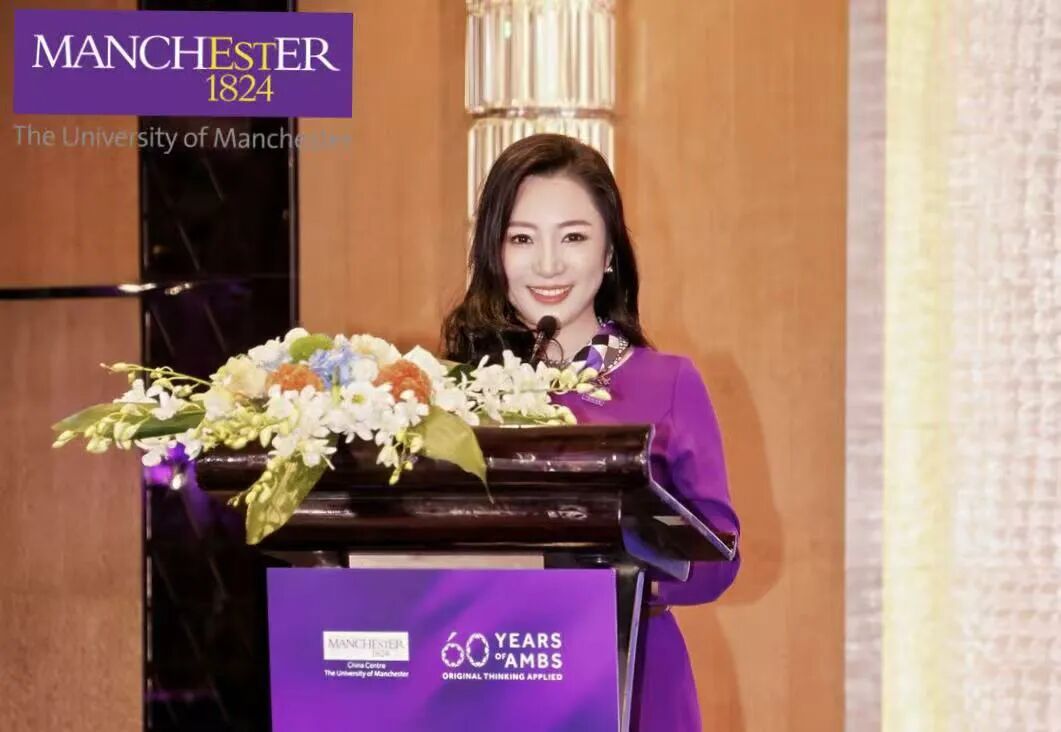
Ms. Sherry Fu, Founding Director of UoM China Centre,hosted the forum.
As the core segment of the forum, the keynote and alumni sharing sessions delivered a series of compelling insights.
Professor Kenneth McPhail delivered a keynote titled “Business Education and Leadership in the Age of AI”, noting that “AI is redefining the boundaries of business education, while the human aspects of leadership—ethical judgment, cross-cultural understanding, and creative thinking—have become more valuable than ever.” His remarks underscored a critical need in today’s AI era: versatile talents who combine technological competence with humanistic and leadership capabilities.
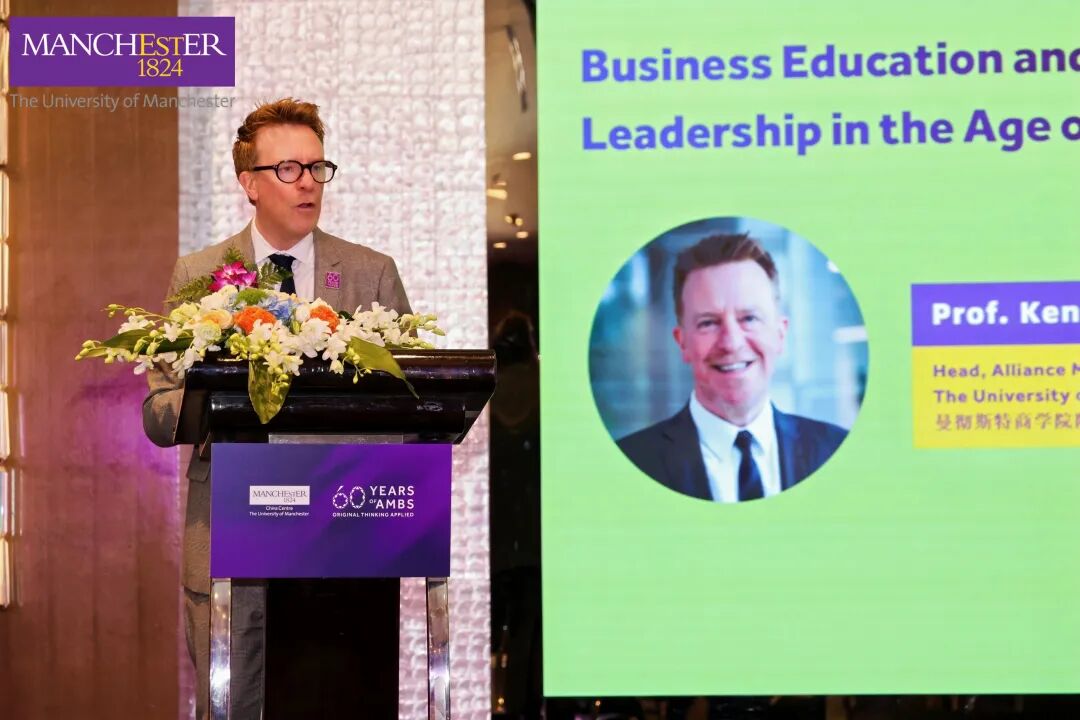
Professor Kenneth McPhail, Head of AMBS,delivered the keynote speech
During the alumni session, three AI industry leaders offered in-depth perspectives on “Artificial Intelligence and Social Responsibility.”
Mr. Francis Ping traced Manchester’s historic roots in AI and emphasized that data is the central driver of AI transformation. He outlined a three-stage roadmap—vertical super tools in the short term, human-machine collaboration in the medium term, and embodied intelligence in the long term—illustrating the commercial value of AI with cases such as Model-Based System Engineering (MBSE) in the railway sector.
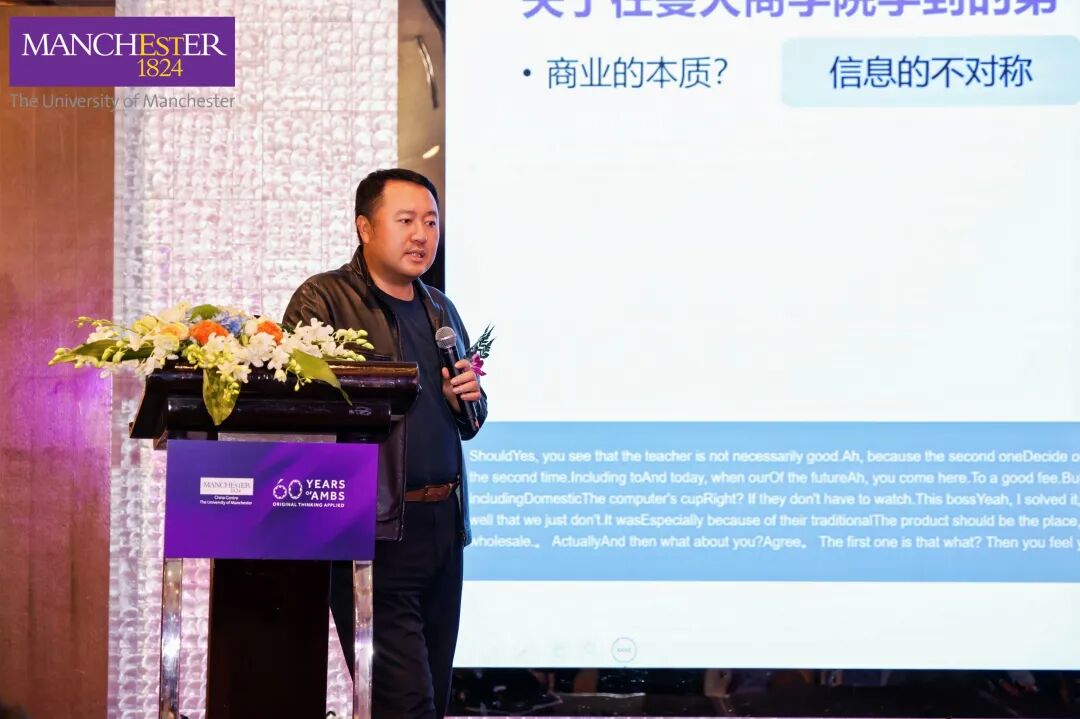
Mr. Francis Ping, delivered the keynote
Dr. Richard Hua reviewed the evolution from convolutional neural networks to Transformer models and large language models, highlighting AI’s transformative impact on robotics, energy storage, and biotechnology. He stressed the need for business education to innovate learning systems and bridge traditional business knowledge with emerging technologies.
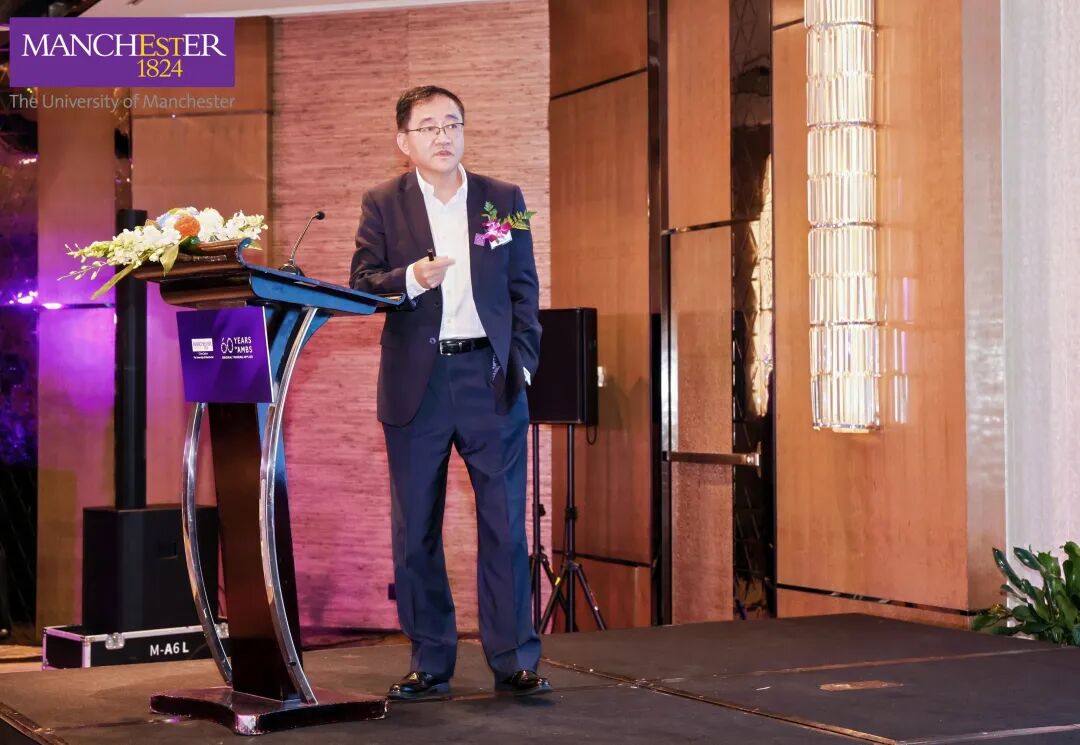
Dr. Richard Hua, delivered the keynote
Mr. Jianwei Qi focused on the rising wave of embodied intelligence and proposed a dual-driven innovation model—technological breakthroughs plus scenario-based applications. He called for collaboration with top global talent to build a universal embodied intelligence platform and accelerate deployment in high-value fields such as healthcare and education.
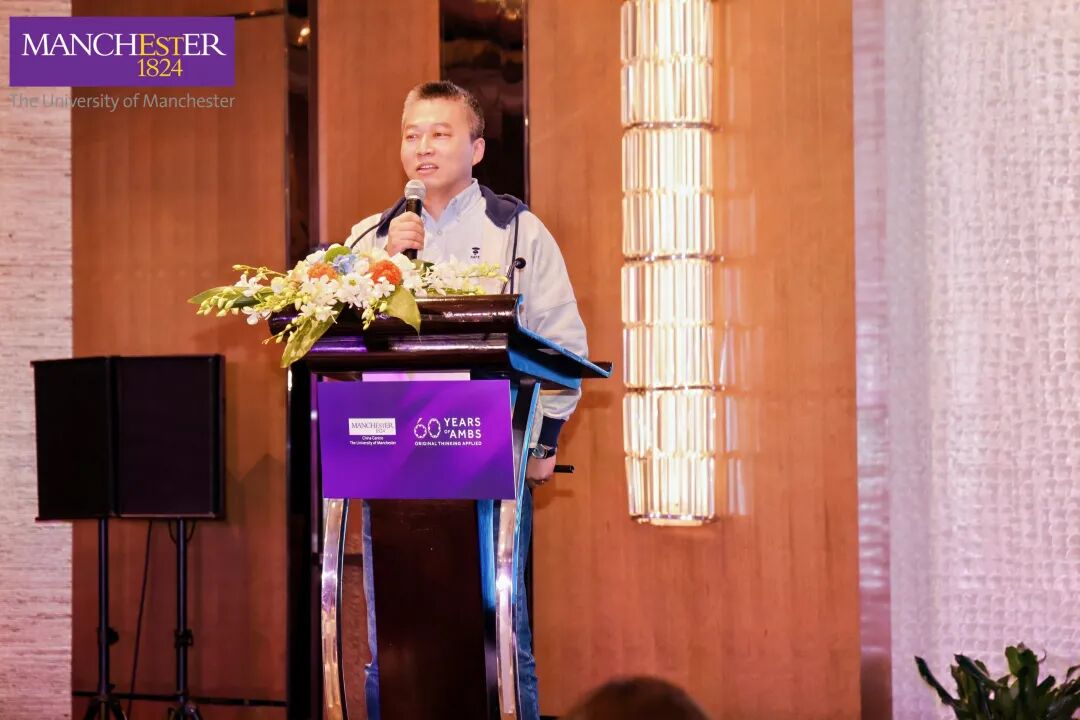
Mr. Jianwei Qi, delivered the keynote
A major milestone of the event was the official launch of the “Alumni AI+ Club” of the University of Manchester China Centre, unveiled by Prof. Kenneth McPhail, Ms. Sherry Fu, Mr. Josh Gabriel and Manchester alumni: Mr. Francis Ping, Dr. Richard Hua, Mr. Jianwei Qi, Dr. Lihui Wang. The Club aims to become a core network connecting Manchester alumni worldwide, facilitating professional dialogue, resource sharing, and collaborative innovation in the AI field. It will foster an ecosystem of “cross-institutional intelligence, technological empowerment, and alumni co-creation,” building a bridge linking academia, industry, and application.
Following the forum, the AMBS 60th Anniversary Alumni Gala Dinner was held, further strengthening alumni connections and future collaboration.
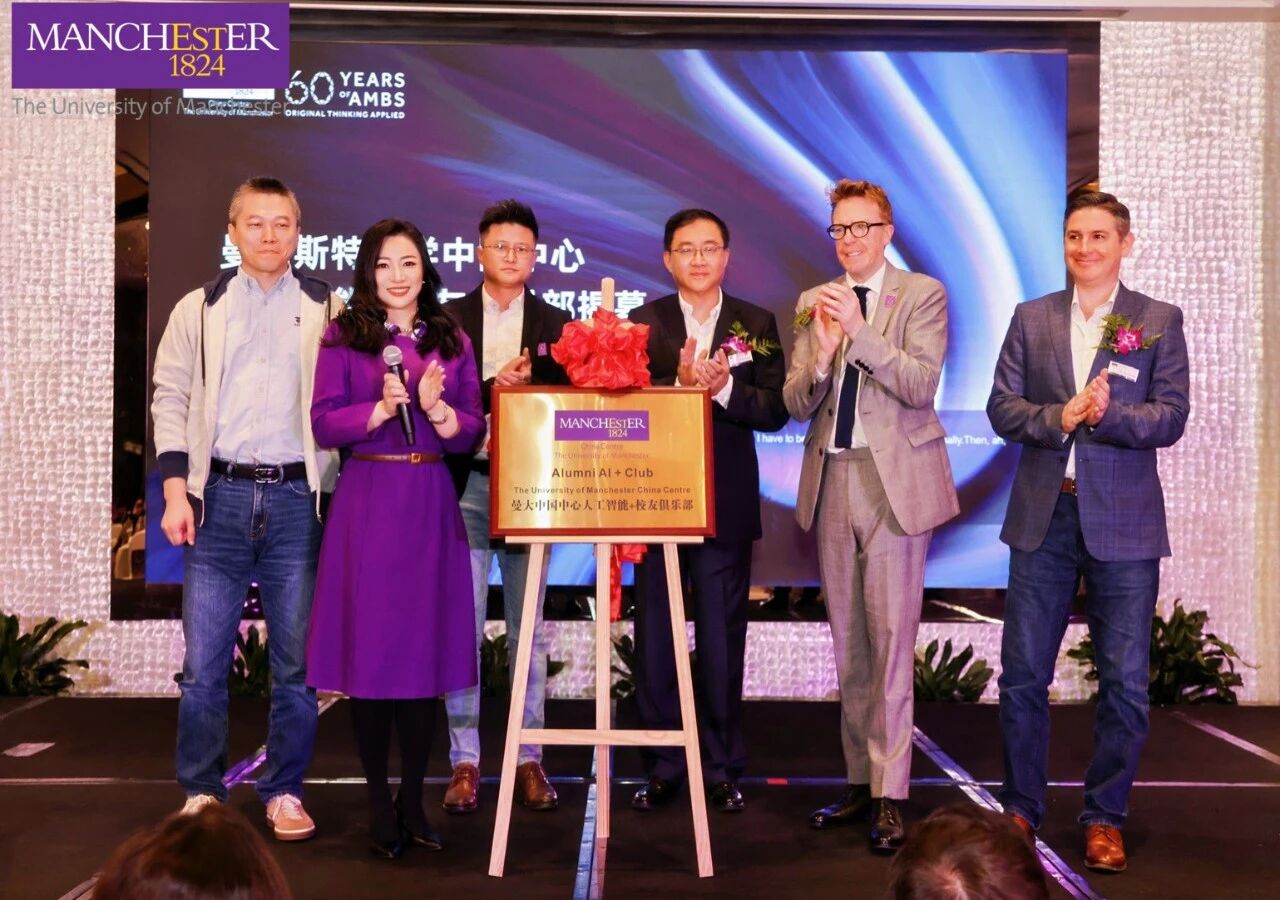
In her closing remarks, Ms. Sherry Fu stated that
The University of Manchester China Centre will continue to serve as a bridge, leveraging the University’s research strength and global alumni network to align AI solutions with societal needs. Through the AI+ Alumni Club, the centre will regularly host cross-disciplinary innovation workshops to contribute to the high-quality development of the AI industry.